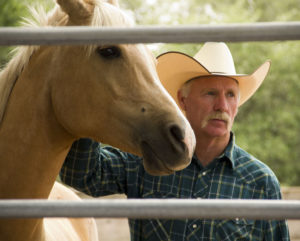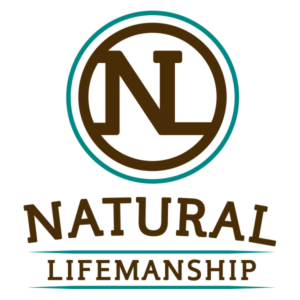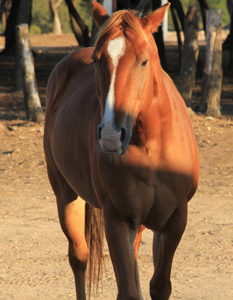Guest columnist Tim Jobe runs NaturalLifemanship and is a leader in equine-assisted therapy. The Texan, who is also an accomplished cowboy poet and horseman, shared this point of view with us:

Tim Jobe
The horse is not a mirror. Before you start shooting, give me a chance to explain:
Would you say your spouse is a mirror? I don’t think I could get away with that. My spouse will react or respond to my emotions, thoughts, or feelings, but definitely doesn’t mirror them back to me. This also happens in a relationship with a horse. The horse responds or reacts to whatever is going on with me and hopefully I do the same thing for the horse. The horse doesn’t mirror my actions. In fact, horse training would be much easier if only this was the case.
If I am too aggressive, the horse may become passive and try to appease me. This often shows up as lowering his head and licking his lips. Some people see this as a good sign. I don’t think that it is. I don’t want my horse to try to appease or submit to me. I want him to make an intelligent, informed decision about the right thing to do.
 Appeasing turns into resentment which turns into aggression. If I am too aggressive, the horse may become aggressive which could be mistaken for mirroring but is really just a reaction to my aggression. On the other hand, if I am passive, the horse doesn’t become passive. It will eventually become aggressive.
Appeasing turns into resentment which turns into aggression. If I am too aggressive, the horse may become aggressive which could be mistaken for mirroring but is really just a reaction to my aggression. On the other hand, if I am passive, the horse doesn’t become passive. It will eventually become aggressive.
Have you ever seen passive parents produce passive kids? I think that is pretty rare. It has been my experience that passive parents have overbearing, aggressive kids. I have worked with lots of people who have horses that bully them all the time. These people are usually too passive with their horses and it ends up causing aggression in the horse. That is in no way a mirroring effect.
It is true that when I am calm my horse has a tendency to become calm. Again, this is merely a response to me, not mirroring. If my energy goes up, so does that of the horse.
Sometimes the horse recognizes some of my needs and tries to provide for them, just like my spouse does or anyone else with whom I have a functional relationship. Yawning is a great example of this: when a horse repeatedly yawns she is trying to release tension, either in herself or in the person working with her.
During sessions, frequently, the horse seems to magically do things to meet the client’s needs. We see this in our other relationships but it doesn’t seem as magical because it is what we expect from good relationships. It is a response to our emotions, thoughts, or feelings – not mirroring.
 When we categorize it as mirroring, we take away the most valuable element of therapeutic work with horses. That is, the ability to build a relationship in which the emotions, thoughts, and feelings of each are important to both and responded to by both. A relationship with a mirror is called Narcissism. A mirror has a passive role in that relationship, and we believe a horse is more valuable when he/she has an active role.
When we categorize it as mirroring, we take away the most valuable element of therapeutic work with horses. That is, the ability to build a relationship in which the emotions, thoughts, and feelings of each are important to both and responded to by both. A relationship with a mirror is called Narcissism. A mirror has a passive role in that relationship, and we believe a horse is more valuable when he/she has an active role.
Horses can only have that role when we understand that they are responding or reacting to us. If we assign the role of mirror to horses we are robbing them of an active status in the relationship. If we want the client to move to a place where they have an understanding of the patterns they create relationships, then the horse must have an active role in that relationship.
The horse is not a mirror. It is a living, breathing being capable of either a functional or dysfunctional relationship depending on what the human wants to build.
Excellent explanation of this important distinction! Thank you Tim for sharing your wisdom based on your experience with horses and people. You’ve called out an area in crtical need of understanding.
Your title definitely intrigued me. Yes, great explanation. I’ve used that term of “mirror” before, but now I’ll work to be more careful in choosing my word. Thanks for the post!
Great explanation! It is a dance and both partners must step in time to be in rhythm.
Love this. So true. Words are so important. Wondering how and when we began using the word mirror to describe them. . .Thanks for sharing.
I think horses attune to us
As we attune to them – it’s a symbiotic energy 🙂
I have had the pleasure of working with a horse I originally had no connection to. Amazingly I came to her when I needed her and she was there for me. Not my mirror but a kindred soul at liberty eventually. I believe we gave each other what was needed in our relationship. I have so so many times found that i only hurt my relation with a horse. Can u I explain? I am not mentally or emotional Bally or physical stable I have been through life trauma
Thoughtful and very well written Tim, thank you.
It drives me crazy when I hear horsey folks talk about how horses can mirror our feelings and you have nailed it here. “Mirroring” has become more of a language of selling equine type therapies and coaching than the reality of a real and caring relationship with a horse.
I do equine therapy in Australia and my horses are wonderful beings with personalities and moods all of their own just like us. They are no mirror to me any more that I am to them but I love the relationship for all of its complexities.
Hey Tim,
This is Larry French from Morrilton Arkansas.
We met at Southern Christian Children’s Home
last year. I really enjoyed your program. It has done amazing things
for kids,adults and me. I highly recommend Tim and his wife.
Tim, I hope to see y’all again. If your nearby give me
a holler. I’ll be in Ft Worth doing a clinic, in April if your in the area.
God Bless you for all y’all do for people and horses.
Larry
Thanks Larry, we will be doing a training in Bentonville on September 15-17. If you are in the area I would love to have supper and catch up on things. Tim
ABSOLUTELY!!! These are sentient beings, with their own opinions, responses and wisdom to share. I am so happy you wrote this blog, as I find the whole “mirror” analogy to be demeaning to the horse and the relationship. Frankly, my horses are the coaches – I’m simply a facilitator.
Bravo Tim Jobe for showing how horses are individuals in their own right, and deserve to be treated as such. But while this essay brings up some important points, the issue of “mirroring,” or “projection,” is not quite so black and white. Sometimes our spouses, children, employees, bosses, political figures, celebrities, and yes, horses, do act as mirrors. This is passive on their part, not intentional, and may have little or nothing to do with who they truly are. But projection is not invaluable or purely narcissistic—if the information is used consciously, with the intent of understanding and changing our own behavior.
Through “projection,” we attribute our our inner feelings, perceived weaknesses and even unrecognized strengths onto others because we’re simply unable, or stubbornly unwilling, to see these qualities in ourselves. If we remain unconscious of this phenomenon, we rarely see others (human or equine) for who they are, and we also miss the important information available to us when we make this phenomenon conscious.
More common is the related phenomenon of “transference,” where our thoughts and feelings toward someone (two-legged or four-legged) are strongly influenced by attitudes originally developed in a significant past relationship.
As Tim emphasized, projection and transference can keep us from seeing others for who they really are. But if we learn to mine these distorted perceptions for information, rather than reject them as mistakes, they become shortcuts to self-knowledge. We use a physical mirror to check our physical appearance. But we have no such mirror for looking at our inner selves. Or do we? Looking honestly at how we respond in relationship, and how others respond back to us as a result, provides a deeper glimpse of who we are than any mirror hanging on the wall.
If we become curious about how we react in certain situations, and why, we can begin to change those patterns. I give numerous examples of this phenomenon with horses and people in essay number 28, “Dharma’s Reflection” in The Way of the Horse: Equine Archetypes for Self Discovery.
Like · Reply · Just now